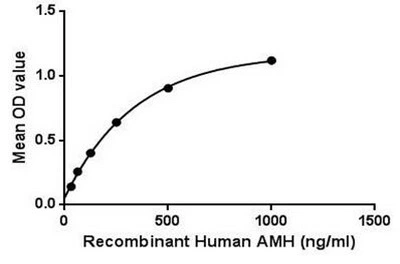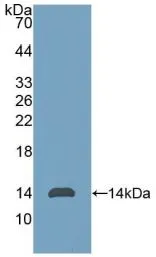
Functional ELISA analysis of GTX00109-pro Human AMH protein which can bind immobilized Smad9 protein.
Human AMH protein, His tag
GTX00109-PRO
ApplicationsFunctional Assay
Product group Proteins / Signaling Molecules
Protein IDP03971
Overview
- SupplierGeneTex
- Product NameHuman AMH protein, His tag
- Delivery Days Customer9
- Application Supplier NoteAnti-Muellerian hormone (AMH), also named Muellerian inhibiting substance (MIS) belongs to a tissue-specific TGF-beta superfamily growth factor. It can be expressed by male sertoli cells and postnatal testis, and ovarian granulosa cells of females postpartum. AMH expression is critical to sex differentiation at a specific time during fetal development, it appears to be tightly regulated by SF1, GATA factors, DAX1 and FSH. AMH signals through a characteristic receptor consisting of a type I and a type II receptor serine/threonine kinase. Especially the type II receptor is unique and specific receptor for AMH. Besides, Mothers Against Decapentaplegic Homolog 9 (Smad9) has been identified as an interactor of AMH, thus a binding ELISA assay was conducted to detect the interaction of recombinant human AMH and recombinant human (Smad9) Briefly, AMH were diluted serially in PBS, with 0.01% BSA (pH 7.4). Duplicate samples of 100 microl were then transferred to Smad9-coated microtiter wells and incubated for 2h at 37C. Wells were washed with PBST and incubated for 1h with anti-AMH pAb, then aspirated and washed 3 times. After incubation with HRP labelled secondary antibody, wells were aspirated and washed 3 times. With the addition of substrate solution, wells were incubated 15-25 minutes at 37C. Finally, add 50 microl stop solution to the wells and read at 450nm immediately. The binding activity of of AMH and Smad9 was in a dose dependent manner.
- ApplicationsFunctional Assay
- CertificationResearch Use Only
- ConjugateUnconjugated
- Gene ID268
- Target nameAMH
- Target descriptionanti-Mullerian hormone
- Target synonymsMIF, MIS, muellerian-inhibiting factor, Mullerian inhibiting factor, Mullerian inhibiting substance, anti-Muellerian hormone, muellerian-inhibiting substance
- Protein IDP03971
- Protein NameMuellerian-inhibiting factor
- Scientific DescriptionThis gene encodes a secreted ligand of the TGF-beta (transforming growth factor-beta) superfamily of proteins. Ligands of this family bind various TGF-beta receptors leading to recruitment and activation of SMAD family transcription factors that regulate gene expression. The encoded preproprotein is proteolytically processed to generate N- and C-terminal cleavage products that homodimerize and associate to form a biologically active noncovalent complex. This complex binds to the anti-Mullerian hormone receptor type 2 and causes the regression of Mullerian ducts in the male embryo that would otherwise differentiate into the uterus and fallopian tubes. This protein also plays a role in Leydig cell differentiation and function and follicular development in adult females. Mutations in this gene result in persistent Mullerian duct syndrome. [provided by RefSeq, Jul 2016]
- Storage Instruction-20°C or -80°C,2°C to 8°C
- UNSPSC41116120
- SpeciesHuman


